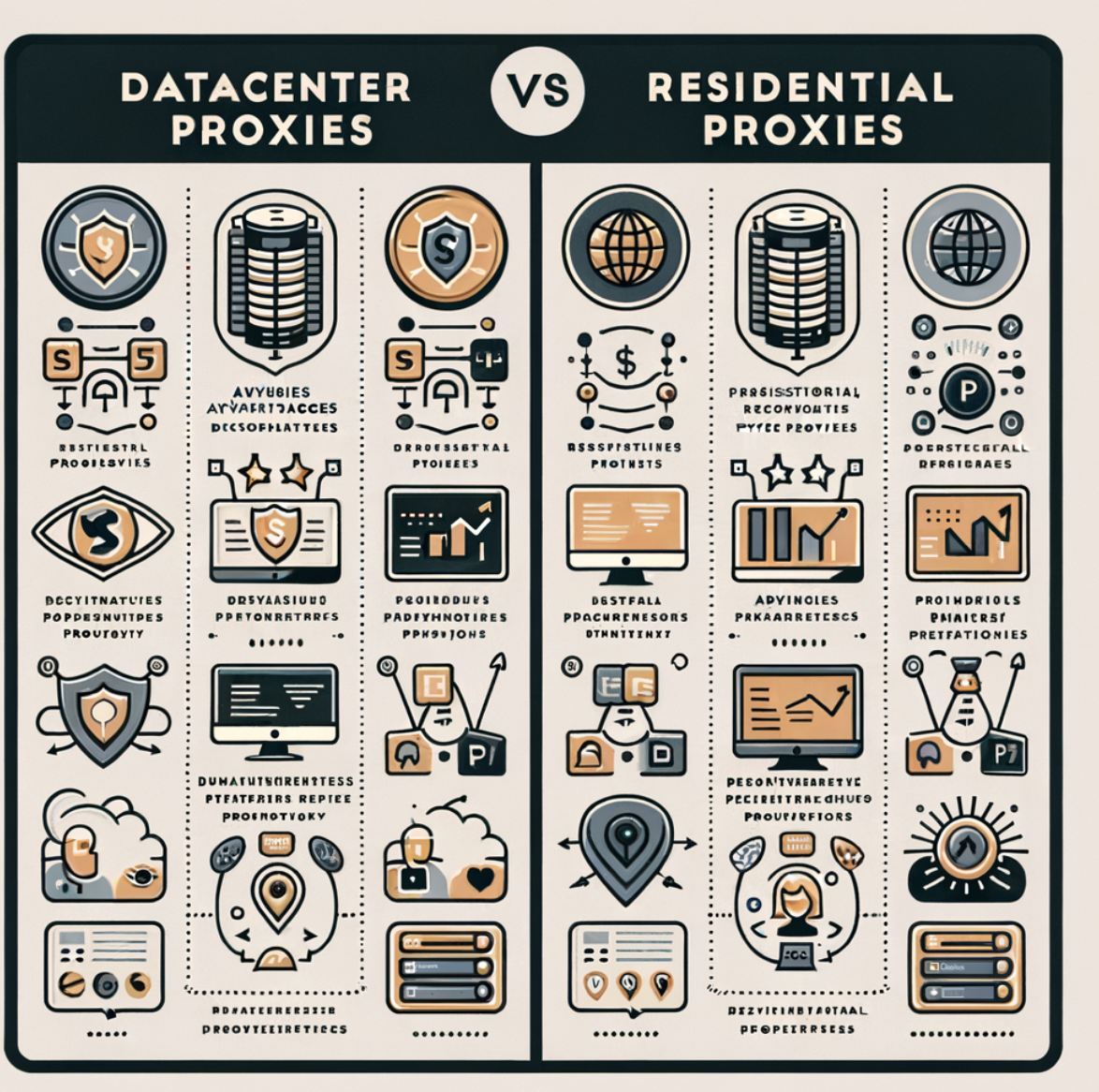Choosing the right proxy type can make or break your online projects, especially when it comes to web scraping, account management, or accessing geo-restricted content. In 2025, the debate between datacenter proxies and residential proxies is more relevant than ever.
What Are Proxies?
A proxy acts as an intermediary between your device and the internet, masking your IP address and allowing you to route traffic through a different location or device. This is useful for:
- Protecting privacy
- Bypassing geographical restrictions
- Running automated tasks without being blocked
- Scraping web data safely
But not all proxies are created equal. Datacenter and residential proxies differ fundamentally in their origin, reliability, and effectiveness.
Proxy Types and Features:
🏘️ Rotating Residential Proxies
Datacenter Proxies Explained
Datacenter proxies are IP addresses generated and hosted on servers located in data centers. These IPs are not assigned by internet service providers (ISPs) but rather come from cloud providers or hosting companies. This means:
- They offer very fast speeds, often between 100 Mbps to 1 Gbps
- They are cost-effective, usually priced at around $0.10 to $0.50 per IP
- However, because they’re easily recognized as coming from data centers, many websites treat them as suspicious, leading to low success rates of about 20-40% on protected sites
Organizations prefer datacenter proxies for high-volume, low-risk tasks due to their speed and affordability.
Residential Proxies Explained
Residential proxies route traffic through devices connected to real homeowner internet connections. These IPs are issued by ISPs to residences and businesses. This gives them a far more authentic and trusted appearance online. Key characteristics include:
- Speeds range from about 10 Mbps to 100 Mbps, which are slower than datacenter proxies but still adequate for most tasks
- Higher pricing, generally between $2 and $15 per gigabyte of data used
- Exceptionally high success rates of 85-95% on sites with strict anti-bot protections
- Superior geographic targeting, allowing city- or state-level precision
Because residential proxies look like regular users, websites are much less likely to block or challenge them, making them ideal for sensitive or high-stakes tasks.
Key Differences Between Datacenter and Residential Proxies
| Feature | Datacenter Proxies | Residential Proxies |
| IP Source | Servers in data centers | Real homeowner ISP-assigned IPs |
| Speed | 100 Mbps to 1 Gbps (very fast) | 10 Mbps to 100 Mbps (moderate) |
| Cost | $0.10 to $0.50 per IP | $2 to $15 per GB of data |
| Success Rate on Protected Sites | 20-40% | 85-95% |
| Detection Risk | High (easy to detect and block) | Low (appear as real users) |
| Geographic Targeting | Limited to the country level | Precise to the city and state level |
| Best Use Cases | High-volume scraping, simple automation tasks | E-commerce monitoring, ad verification, and account management |
| Reliability | Lower due to frequent blocking | Very high, less likely to be banned |
Why Residential Proxies Are Increasingly Preferred
In 2025, websites and platforms have become more sophisticated at detecting non-human traffic, especially IPs originating from data centers. This means the success rates of datacenter proxies have dropped significantly on many popular sites like Google, Amazon, and social media networks. Residential proxies, on the other hand, mimic real user connections and have remained effective.
Some key benefits of residential proxies are:
- Bypass geo-blocks and censorship with real IP addresses from target locations
- Avoid CAPTCHAs and IP bans during high-frequency scraping or automation
- Accurate local data scraping for price comparison and market research
- Suitable for social media management and multi-account handling due to authenticity
When to Use Datacenter Proxies
Datacenter proxies still hold value for:
- Projects that prioritize speed above all else
- Non-sensitive tasks where occasional blocks won’t harm the project
- Bulk data crawling with modest success expectations
- Budget-limited scenarios where volume trumps precision
When to Choose Residential Proxies
Residential proxies are worth the investment when:
- You require greater stealth and access success on websites with anti-bot systems
- Your project demands precise geo-targeting down to city or ISP level
- You manage multiple accounts or automate logins and want to avoid detection
- You’re working in industries with strong regional restrictions like e-commerce, travel, or ad verification
ProxyEmpire’s Residential and Datacenter Offerings
ProxyEmpire is a premium proxy service provider designed to empower web scraping, data collection, and unrestricted internet access through a vast network of ethically sourced residential, mobile, and datacenter proxies. Below is a detailed description based on the provided information:
Overview of ProxyEmpire
ProxyEmpire offers a comprehensive suite of proxy solutions tailored for individuals, businesses, and developers seeking reliable, high-performance tools for data gathering, privacy protection, and bypassing geo-restrictions. With over +30 million clean IP addresses spanning 170+ countries, ProxyEmpire provides unparalleled global coverage, ensuring users can access content at scale with a 99.9% uptime and lightning-fast response times (as low as 0.6 seconds).
Proxy Types and Features:
🏘️ Rotating Residential Proxies
Key Benefits
- Global Reach: Access to over +30 million IPs worldwide, covering every major region, with precise targeting options (country, city, state, ASN/ISP).
- High Reliability: A 99.86% uptime ensures uninterrupted service, supported by patented technology for enhanced speed and security.
- Ethical Sourcing: Proxies are responsibly harvested, ensuring quality and compliance.
- Versatile Use Cases: Supports web scraping, price monitoring, sneaker copping, SEO tracking, ad verification, and more.
- Integration-Friendly: Compatible with standard proxy protocols (HTTP, SOCKS5) and third-party tools like Multilogin, Dolphin Anty, Kameleo, Octobrowser, and Gologin.
- No Hidden Fees: Transparent pricing with all features included, starting at a $1.97 trial.
Use case:
Why Choose ProxyEmpire?
- Massive Proxy Pool: Over +30 million IPs, outpacing competitors with broader coverage and quality.
- Superior Performance: High success rates (up to 99.95% for scraping) and industry-leading speeds.
- User-Friendly: Intuitive dashboard, developer-friendly documentation, and 24/7 support with dedicated account managers for corporate clients.
- Cost-Effective: Flexible pricing with no limits on concurrent sessions and a rollover data feature unique to ProxyEmpire.
Statistical Insights on Proxy Usage (2025 Data)
According to recent market research and industry reports:
- Residential proxies dominate the proxy market and account for approximately 65-70% of high-success use cases in data scraping and ad verification
- Datacenter proxies maintain around 25-30% share primarily due to cost-effectiveness and speed
- Residential proxies achieve 85-95% success rates on heavily protected websites versus 20-40% for datacenter proxies
- The average residential proxy speed is between 10-100 Mbps, adequate for most automation needs, while datacenter speeds soar from 100 Mbps to 1 Gbps
- Businesses often report a 3x better ROI when switching to residential proxies despite higher costs
FAQ:
1. What is the difference between Datacenter and Residential proxies?
Datacenter proxies are hosted on powerful servers provided by data centers, offering high speed, scalability, and affordability. Residential proxies, on the other hand, route your traffic through real user devices with genuine ISP-assigned IPs, making them more authentic and harder to detect.
2. Which is faster, Datacenter or Residential proxies?
Datacenter proxies are generally faster because they rely on high-performance servers with dedicated bandwidth. Residential proxies are slightly slower due to routing through real household connections, but they provide better anonymity and lower detection risk.
3. Are Datacenter proxies easier to detect than Residential ones?
Yes. Datacenter proxies can be easily flagged or blocked by websites that use anti-bot systems, since the IPs come from known data centers. Residential proxies use real-world IP addresses, making them virtually indistinguishable from actual users.
4. Which proxy type is best for web scraping?
If you need speed and scalability, go for Datacenter proxies. If you’re scraping protected or geo-restricted websites, Residential proxies are the better choice because they bypass detection and simulate genuine users.
5. Which one is more affordable?
Datacenter proxies are typically cheaper, as their IPs are generated in bulk and not tied to physical ISPs. Residential proxies cost more due to their authenticity and higher success rates on strict websites.
6. Are Residential proxies legal to use?
Yes, Residential proxies are legal when used for ethical purposes like SEO monitoring, ad verification, or market research. However, using them for fraudulent or malicious activities is strictly prohibited.
7. Can I rotate IPs with both proxy types?
Absolutely. Both Datacenter and Residential proxies can be set to rotate IPs automatically, though residential rotation is more natural, mimicking real user behavior.
8. Which proxy is better for managing multiple social media accounts?
Residential proxies are best suited for social media automation because platforms like Facebook, Instagram, and TikTok easily detect Datacenter IPs as artificial. Residential IPs maintain account stability and reduce the risk of bans.
9. Do Datacenter proxies offer location targeting?
Yes, but with limited precision. You can choose country-level targeting with most Datacenter proxies. Residential proxies, however, allow city or even ASN-level targeting, ideal for localized tasks like ad testing or geo-specific SEO.
10. Which proxy type should I choose?
Choose Datacenter proxies if your priority is speed, volume, and budget efficiency, perfect for bulk scraping or data analysis. Choose Residential proxies if you need stealth, authenticity, and geo-targeting, ideal for automation, eCommerce monitoring, and market research.
11. Can I use both proxy types together?
Yes, many professionals combine both to balance performance and reliability. For instance, start tasks with Datacenter proxies for bulk data, then switch to Residential proxies for sensitive or restricted websites.
12. What’s the best use case for Datacenter proxies?
- Large-scale scraping (SERP, price monitoring)
- SEO audits and data collection
- Automation requiring speed and uptime
13. What’s the best use case for Residential proxies?
- Ad verification and brand protection
- Social media and eCommerce account management
- Accessing geo-restricted content or websites
14. Are there limits on bandwidth or requests?
Datacenter proxies often come with unlimited bandwidth. Residential proxies may have bandwidth limits due to the cost of real IP leasing, but providers often offer flexible plans.
15. How do I decide which proxy type fits my business goals?
Ask yourself:
- Do I need speed → Datacenter proxies
- Do I need stealth and real-user IPs → Residential proxies
- Do I need both reliability and flexibility → Use a hybrid setup




















